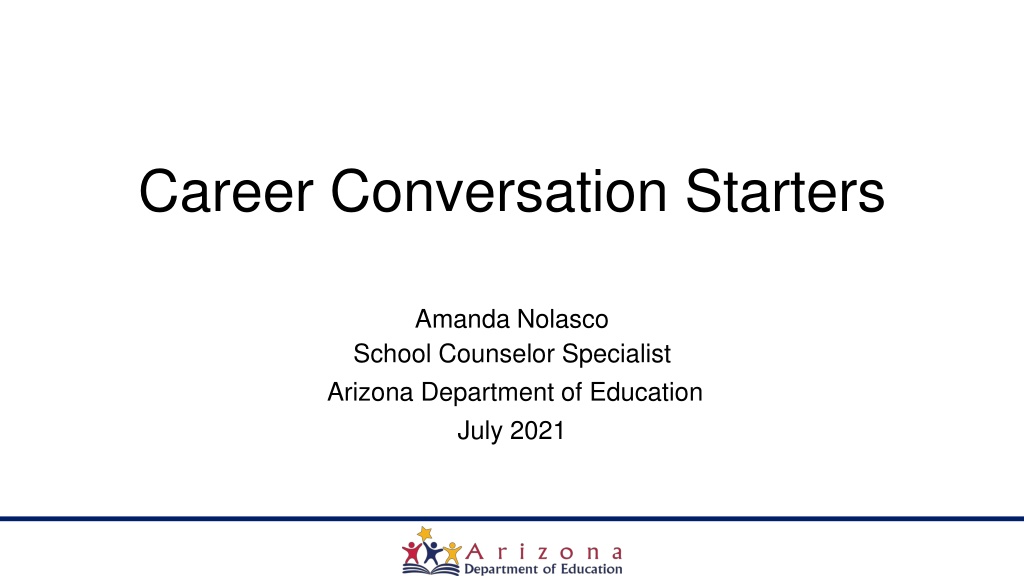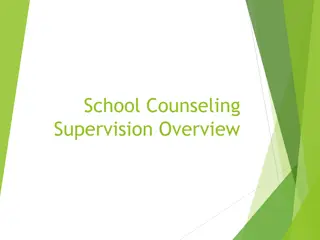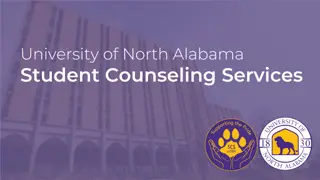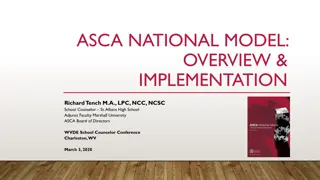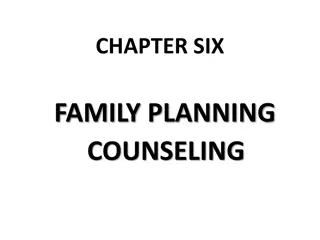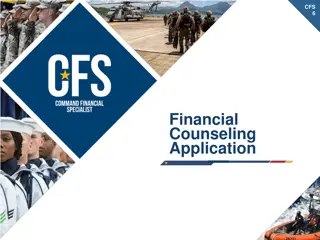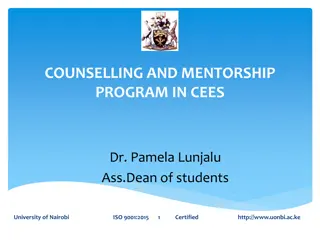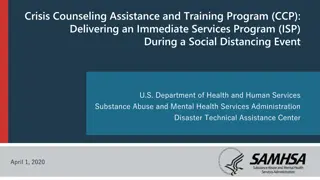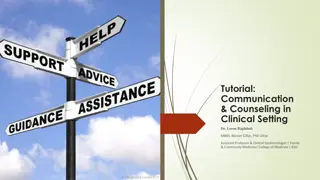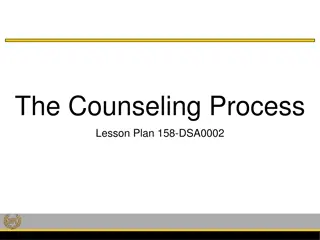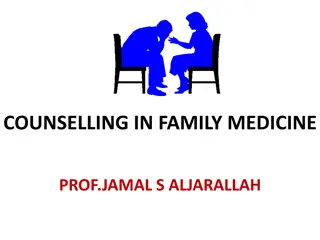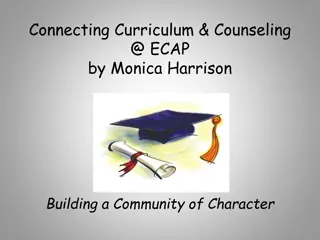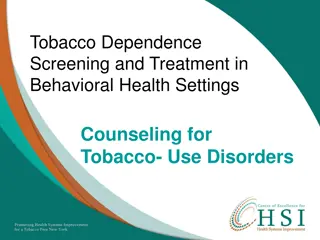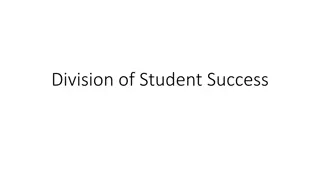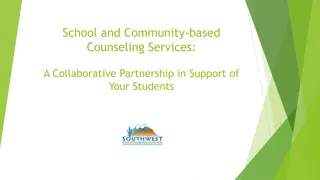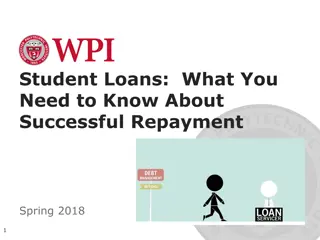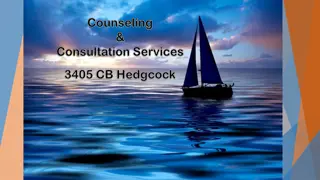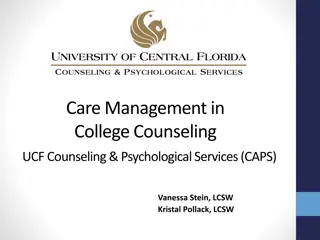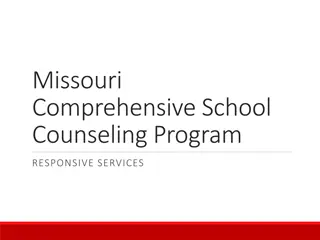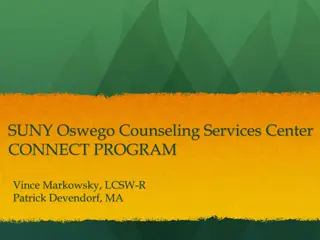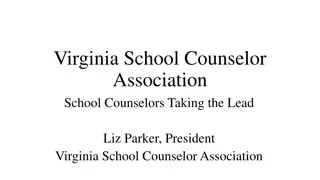Comprehensive School Counseling Strategies for Student Success
Arizona Department of Education's School Counselor Specialist, Amanda Nolasco, shares insights on implementing comprehensive school counseling programs focusing on academic, social-emotional, and career development standards. She emphasizes the importance of using ASCA Career Conversation Starters to enhance student success and career preparedness across K-12 levels. Explore resources like Arizona Career Literacy Standards and ASCA Student Standards to support students in their educational journey.
Download Presentation

Please find below an Image/Link to download the presentation.
The content on the website is provided AS IS for your information and personal use only. It may not be sold, licensed, or shared on other websites without obtaining consent from the author. Download presentation by click this link. If you encounter any issues during the download, it is possible that the publisher has removed the file from their server.
E N D
Presentation Transcript
Career Conversation Starters Amanda Nolasco School Counselor Specialist Arizona Department of Education July 2021
ADE School Counselor Specialist ADE School Counselor Specialist Agua Fria High School 8 years School Counselor & Department Chair Phoenix Union High School District 3 years Counselor Facilitator Arizona Department of Education 2 years School Counselor Specialist Stapley Junior High 6 years English Teacher Millennium High School 3 years School Counselor Education & Advocacy ACTEAZ Goals Associations AzCTE Leads Comprehensive School Counseling Programs AzSCA Relationships
Objectives for Today Review ASCA Student Standards: Mindsets & Behaviors for Student Success Foundations of ASCA Career ConversationStarters Review the high school ASCA Career ConversationStarters Identify ways to use the ASCA Career Conversation Starters with parents, students, and community members
Arizona Career Literacy Standards Career Development & Preparation 9-12 Career Exploration 5-8 Career Awareness K-4 The Arizona Career Literacy Standards focus on K-8 www.azed.gov/cte/arizona-career-literacy CTE Professional Skills focus on 9-12 www.azed.gov/cte/profskills
Academic Achievement Social Emotional Career School Counselors School Counselors are certified/licensed educators who improve student success for ALL students by implementing a comprehensive school counseling program. Academic Development Standards guiding school counseling programs to implement strategies and activities to support and maximize each student s ability to learn. Career Development Standards guiding school counseling programs to help students 1) understand the connection between school and the world of work and 2) plan for and make a successful transition from school to postsecondary education and/or the world of work and from job to job across the life span. Social/Emotional Development Standards guiding school counseling programs to help students manage emotions and learn and apply interpersonal skills. Source: www.schoolcounselor.org
ASCA Student Standards: Mindsets & Behaviors for Student Success Credit: Getty Images/iStockphoto
ASCA Student Standards: Mindsets & Behaviors for Student Success The ASCA Student Standards: Mindsets & Behaviors for Student Success: K-12 College-, Career- and Life-Readiness Standards for Every Student describe the knowledge, attitudes, and skills students need to achieve academic success, college and career readiness and social/emotional development. The standards are based on a survey of research and best practices in student achievement from a wide array of educational standards and efforts. Source: www.schoolcounselor.org Mindsets-Behaviors.pdf (schoolcounselor.org)
ASCA Student Standards: Mindsets & Behaviors for Student Success Source: www.schoolcounselor.org
ASCA Student Standards: Mindsets & Behaviors for Student Success Source: www.schoolcounselor.org
Career Conversation Starters - Premises Source: www.schoolcounselor.org
H I GH S CH OOL Premises: 1.All students have the opportunity to explore interests, abilities, values and goals with a certified school counselor. 2. All students have f reedom of postsecondary training and career choice. 3. Career development engages students, parents and community partners. 4. Career development is a l i felong process beginning at pre- K. 5. Students have the r ight to change their career aspirations and goals at any time. 6. Career conversations are primarily strength-based. Instructions: Determine the student s needs based on the corresponding ASCAMindsets & Behaviors. Some students may need to addresseach Mindset & Behavior standard throughout the years, while others may only need to focus on a few. Adapt these questions to meet individual students needs. ASCAMindsets & Behaviors Questions/Parents Questions/Community Questions andPrompts/Students MINDSETS Belief in development of whole self, including a healthy balance ofmental, social/emotional and physical well-being (M1.) 1.As you look over the last few months, what accomplished that has been a real highlight? 1.H o w would you characterize the quality of life (physical and mental health) of our community? 1.Tell me about a time you felt proud of something you accomplished in the last few months. has your child 2.What challenges or struggles have you observed your child facing? 2.If our students were at their best, h o w would our community be different (Physically, socially and emotionally)? 2.What else would you like to accomplish this year? 3.What has gotten in your way of these accomplishments in the past? 3.Could you give me an example of a time when your child was faced with a challenge and he/she was able to successfully resolve the issue on his/her own? 4.H o w do nutrition and sleep play a role accomplishments? 3.What kinds of programs/ services/resources would you like to provide in partnership with our school/district to help our students be their best? in your 5.What s it feel like when you are faced with a new task in class? 4. H o w do you know when you need to step in, be supportive or let children struggle and f ind solutions on their own? 6.What do you tell yourself when an assignment or activity is hard? 7.D o your thoughts help or hurt your success? How? 5.As you think about post- high- school life for your child, what skills might he/ she still need to develop to be successful? What community programs/ activities could help develop these skills? 8.Is there anything you need to change about what you say to yourself? What? 9.W ho are your strongest supporters? 6.Describe a time when you felt proud of your family. What are some of the values you have worked to pass a long to your children? H o w have you seen your child practice/develop those values over time? 10.What activities or places make you feel safe and valued? Why? 11.In what community activities do you currently participate? Are there others in which you might enjoy being involved? 12.H o w could your involvement change h o w you think about your life after h i g h school?
ASCAMindsets & Behaviors Questions/Parents Questions/Community Questions andPrompts/Students Self-confidence in ability to succeed (M2.) 1.Tell me about your child s level of confidence when faced with a new task. 1.Tell me about a time you felt proud of something you accomplished in the last few months. 2.Describe your child s approach to working through a challenging assignment or problem. 2.Tell me about a time you completed a math assignment that made you proud. English? Writing? 3. H o w motivated is your child to complete schoolwork without being assisted? 3.What else would you like to accomplish this year? Sense of belongingin the school environment (M3.) 1.Is there something your child looks forward to? Please describe. 1.H o w would you describe the school s environment? School counselors: You may want to look at the questions in this instrument to guide conversations: Psychological Sense of School Membership Scale (PSSM; Goodenow & Grady, 1993). Can be found at www. communityschools.org/assets/1/ AssetManager/Survey7.pdf 2.In what ways would you suggest the school s environment could be improved? 2. H o w would you rate your child s school experience on a scale of 1-10? Why did you give it that number? 3.H o w could we partner with you to school s environment? 3.If your child had the perfect day at school, what would it look like? improve our 1.Tell me about the activities you are involved in during the school day and after school. 4.What do you think needs to happen to get closer to the ideal school day? 2.What is your favorite part of the school day? 3.If you had to rate your school on a scale of 1-10 (1=terrible, 10 = amazing), what would you rate it?Why? 4.What would it take for our school to be amazing? 5.Can you think of anything you can do to get your experience a little closer to amazing? Please describe. 6.If you were g o i n g to try something new to be involved in this year, what would it be?
ASCAMindsets & Behaviors Questions/Parents Questions/Community Questions andPrompts/Students Understanding that post- secondary education and lifelong learning are necessary for long-term career success(M 4.) 1.Have you had the opportunity to discuss what types of things your child might do after h i g h school? Community partners might be helpful as guest speakers in classes, at job fairs or on panels. 1.Imagine your life five years after you graduate f rom h i g h school. What challenges do you want to solve? H o w does this relate to a career? 2.Have you had the opportunity to discuss the types of problems your child would like to solve in the future? 1.What type of training/ education did you receive for your career? 2.As you consider your future, what types of options after h i g h school have you already explored (e.g., two- year college, four- year college, certificates, trades, internships)? 2. H o w do you stay knowledgeable in your field? 3.What programs have you already explored related to your child s career choice (e.g., two- year college, four-year college, certificates, trades, internships)? 3.Would you be willing to demonstrate something you learned f rom your training/education that you use frequently? 3.What concerns or questions came up for you as you explored? 4.To achieve your career goals, h o w l ong are you willing to go to college or other type of training? 5.What does success mean to you when it comes to a career? 6.What do you want your lifestyle to be like after h i g h school? 7.D o your lifestyle expectations match your career and education goals? If not, what adjustments are you willing to make? Belief in using abilities to their fullest to achieve high- quality results and outcomes (M5.) 1.Consider the test results/ your child earned this year. D o think these tests/grades match child s actual abilities? grades Teachers: 1.In what ways do you convey results to students in the classroom? 1.Describe a time you felt successful. you your 2. Describe your strengths. 3.What would other people say are your strengths? 2.Describe why there might be differences. 2.H o w do you personally celebrate progress? 4.When thinking of your future, are there any skills you would like to further develop? 3.What might be a better measure of your child s abilities? 3.H o w do you celebrate progress with your students? 5.What can you do to make this happen? 4.H o w might we better motivate your child to achieve his/her best- quality work? 4.Would you like more information on h o w to interpret assessment results? 5. H o w do you think we might use our assessment results to more positively motivate students?
ASCAMindsets &Behaviors Questions/Parents Questions/Community Questions andPrompts/Students Positiveattitude toward work andlearning (M6.) 1.H o w would you describe your child s attitude toward learning? Work? 1.F inding a career that is the r ight fit contributes to overall satisfaction. D o you k n o w people in our community w h o have a positive attitude toward work? 1.Describe a project you successfully completed recently. 2. H o w did youfeel? 2.Are there times when your child is more positive about school than others? What is happening during those times? 3.Did anyone notice/comment on your success? What did they say? 4.What did you do to successfully complete the project? Be as specific as possible. 2.H o w might we create a partnership with these people? 5.What strategies can you use to help you successfully complete other projects? 6.H o w do these strategies relate to your future? 7.D o you k n o w of people in our community that enjoy their work? Describe. 8.H o w would you like to think and feel about your work?
ASCAMindsets & Behaviors BEHAVIOR: LEARNING STRATEGIES Questions/Parents Questions/Community Questions andPrompts/Students Demonstrate critical-thinking skills to make informed decisions (B-LS1.) 1.Could you tell me about a time your child had to think through a difficult problem by himself/herself? 1.Critical- thinking skills are part of student development in the area of career and college readiness. What types of projects or activities might your organization or group have that our students could assist with to develop theseskills? 1.H o w do you react when faced with a new and challenging situation in the classroom or during an extracurricular activity? 2.What steps did he or she take? What solution was found? 2.Can worked situation? H o w did you feel? you describe through a time challenging you a 3.H o w often does your child get the opportunity to work through critical decisions or problems? H o w does he/she react? 3.Choosing a career path can feel like a b i g decision. What information have you gathered to help you make decisions about your future? 2.What other real- world problems might our students help solve to gain experience with critical thinking? 4.Thinking about challenges you want to solve in life may help you narrow do w n a career path. Have you thought about challenges you would like to solve? 5.You might change your mind, but what type of education are you currently leaning toward (four-year college, two- year college, industry- recognized training program or g o i n g straight towork)? 6.H o w do your values and interests play a role in your decision? (School counselors: Utilize career assessment results here.) 7.If a college admissions counselor or human resources department at a potential employer were to evaluate your behaviors at school, what would they say? 8.What are you currently doing that will help you accomplish your goals? 9. Anything you need to adjust?
ASCAMindsets & Behaviors Questions/Parents Questions/Community Questions andPrompts/Students Demonstrate creativity (B-LS2.) 1.Tell me about ways in which your child is creative or imaginative. 1.Many employers are l ooking employees w h o can be innovative, out-of-the-box creative thinkers. In what ways does out- of- the- box thinking help your organization work strategically in the community? for 1.What world/community challenges do you want to solve (miracle question)? 2.H o w do you think creativity helps your child learn? 2.H o w would you approach this challenge differently than what is being done in the world/your community now? 3.Can you think of careers related to tackling thischallenge? 2.H o w might we help students be more creative? 4.Can you think of any STEM careers related to tackling this challenge? 3.Many people think of creativity in terms of arts and humanities. D o you have examples of creativity in STEM that might help us stimulate student interest in STEM fields? 4.H o w might we do a better job of integrating STEM and art ( STEAM) in our school? Note, these won t be useful questions for every community partner. Use time- management, organizational and study skills (B-LS 3.) 1.H o w would you rate your child s t ime- management, organizational and study skills? 1.Many employers are looking for employees with excellent organization and t ime- management (self- initiation) skills. H o w important is that to your organization? 1.H o w would you rate your time- management, organizational and study skills on a scale of 1- 10? Describe your rating. 2.In what ways do his/her habits a l i gn and not align with future goals? 2.D o you believe your strategies will get you the grades, future job and postsecondary education experience you want? How? 2.What are some examples of things that might g o w r o ng i f individuals in your organization did not have these skills? 3.In what ways do you support your child s t ime- management, organizational and study skills? 3.Is there anything you would like to change about your time- management or study skills that will help you reach your goals? (If yes, have student develop a plan. If no, then check back in at a later date.) 4.Is there anything you think would be helpful to your child to support his/ her t ime-management, organizational and study 3.What are some ways you could demonstrate these skills to students that might help them connect school to the world of work (e.g., a three- minute video that would be shown during a classroom lesson on organization)? skills?
ASCAMindsets & Behaviors Questions/Parents Questions/Community Questions andPrompts/Students Apply self- motivation and self- direction to learning (B-LS 4.) Note to school counselors: For these questions consider having students share their career assessments with parents/ guardians. 1.Self- motivated learning is important because in their careers students will have to be self-initiating. H o w might we improve self- motivation in h i g h school students? Note to school counselors: For these questions consider referring to the student s career assessments to help the student relate motivation to work values. 1.Are your child s career assessments connecting to his/her classes and/or extracurricular activities? 1.After taking the career assessments, what do you notice is important to you in a career? 2.What does your organization do to inspire self-motivation in youth? 2.H o w do your career assessments connect to your classes and/or extracurricular activities? 2.Are there classes or extracurricular activities your child could take that would better relate to his/ her career interests? 3.Is there anything you would like to adjust to better align your activities to what is important to you? Apply media and technology skills (B-LS 5.) 1.D o you have Internet access at home? 1.H o w do you usemedia and technology in your organization? 1.What types of technology and software do you use regularly? H o w do you useit? 2.Can we assist you in f inding a convenient location for your child to access the Internet for academic purposes? 2.What technology skills do people need to have to be hired or be successful in your organization? 2.H o w can these technologies assist you in your future career? 3.Can you think of some STEM careers related to your hobbies/ interests? 4.Are there any STEM careers you would like to k n o w more about?
ASCAMindsets & Behaviors Questions/Parents Questions/Community Questions andPrompts/Students Set high standards of quality (B-LS 6.) 1.Are you familiar with the college admissions process? Consider collaborating with college admissions counselors and financial aid advisors to provide information to parents and students. 1.Given that schools are often told to push students to achieve h i g h standards of quality, h o w would you as a community partner define h i g h standards of quality? 1.Tell me about a project, assignment or activity that you put a lot of effort into. (Be sure students describe specifics about the actions they took to accomplish the task.) 2.Would you like more information about college admissions? 2.H o w did you feel about the results of your hard work? 3.Has your child taken any SAT or A C T prep courses? Has your child completed any dual credit, dual enrollment or industry certifications? If not, would you like more information about these services? 3.If you continue to put a lot effort into your work, h o w do you think you will do in college or on the job? 2.What measures of quality do you believe accurately reflect h i g h standards for our students? 4.Are you familiar with the FAFSA? 4.Are there any classes or activities you are involved in that you would like to put more effort into? 5.Would you like more about the FAFSA and other ways to pay for college? information 3.H o w might we better prepare our students to meet h i g h standards of quality in their future employment? 5.What type of postsecondary training have you considered? 6.What do you k n o w about the college admissions process? 7.Have you taken any SAT or A C T prep courses? If not, would you like to? 8.If you choose to g o to college, do you k n o w h o w you will pay for it? Identify long- and short- term academic, career and social/ emotional goals (B- LS 7.) Consider having students share their goals with parents/guardians on an annual basis. Note to school counselor: Consider goal setting with students throughout high school. 1.Based on your exploration of different career options and career assessments do you have ideas about future careers? Describe. 2.What are you currently doing that is helping you prepare for your life after high school? Academically? Career related? Socially? 3.What are you not doing that you think would help? 4.I d like you to set a goal that is specific and challenging but attainable related to your academics. Given your career interests and postsecondary plans, what academic goal would make sense for you?
ASCAMindsets & Behaviors Questions/Parents Questions/Community Questions andPrompts/Students Actively engage in challenging coursework (B-LS8.) Consider having students share their goals with parents/guardians on an annual basis. 1.When students are challenged in courses, we want them to develop perseverance and resilience by working through difficulties. H o w do you think we might build challenges into courses and support student strengths? These questions are a continuation of number 7 above. 1.Are there any adjustments we should make to your course schedule for next term or next year that would better prepare you and a l i gn your future goals? to 2.In what ways might students benefit f rom team building, cooperative learning and collaboration skills in working through challenging coursework? 2.Are there classes where you are putting in a lot of effort to succeed? Describe. 3.Are there classes where you would like to put in more effort? Describe. 4.What are you willing to do differently? 3.What other skills might help them learn to navigate these challenges and build perseverance and resilience. Gather evidence and consider multiple perspectives to make informed decisions (B-LS9.) Consider career interest with parents/guardians on an annual basis having students share their Note to school counselor: This is less about questions and more about students investigating/ exploring career and postsecondary options, interests, values and abilities. 1.After e n g a g i ng in career exploration, taking career assessments, talking to community members about careers and taking into account what you like, what types of careers are of interest? 2.What type of postsecondary training is g o i n g to help you get the career you want? 3.What type of exploration have you done in terms of your postsecondary training choice? 4.D o you need help with the admissions process, looking into f inancing options or anything else?
ASCAMindsets & Behaviors Questions/Parents Questions/Community Questions andPrompts/Students Participate in enrichment and extracurricular activities (B-LS 10.) 1.In what types of afterschool activities, weekend and summer activities/programs is your child involved? 1.Enrichment and extracurricular activities help students develop workplace skills and interpersonal relationships. partner with you to improve enrichment or extracurricular programs for our students? 1.What kinds of things do you enjoy doing after school? On weekends? In the summer? H o w might we 2.What types of activities would you like to be involved in? What keeps you from being more involved in extracurricular activities? 2.In terms of school success and career preparation, h o w might extracurricular activities help your child develop? What skills or interpersonal relationships might be developed through these activities? 2.What kinds of programs are needed in our school community? 3.If you could choose any weekend activity to participate in, what would itbe? 4.H o w might participating in these kinds of activities prepare you for your life after high school? BEHAVIOR: SELF-MANAGEMENT SKILLS Demonstrate ability to assume responsibility (B-SMS1.) 1.What responsibility do you believe your child has as a citizen? 1.As students get older, we want to encourage them to take more personal responsibility. From your perspective, h o w can schools encourage students to take more responsibility? 1.Tell me about your responsibilities. Include responsibilities both in school and outside of school. 2.What opportunities does your child have to fulfill responsibilities related to community? 2.H o w are your responsibilities helping you achieve your career or college goals? 3.Is there anything you would like to add that will help you achieve your goals? 2.Given that students are citizens, what are some ways students can begin to assume responsibility in our community? 4.Are there any community service activities you would enjoy? 3. H o w can we partner to provide students with these types of service opportunities? Demonstrate self-discipline and self-control (B-SMS 2.) 1.Self-control is important in a school and work setting. When something upsets your child, what are some ways he/she copes? 1.As you think about the importance of self-control and self-discipline for future workers, what self- discipline or self- control skills do you think h i g h school students need? 1.What is a goal you have set for yourself and achieved? 2.What steps did you take to achieve that goal? 3.What is another goal you want to set for yourself? 2.Given that self-control takes time to develop, h o w would you describe your child s maturity over time? More or less self- control? 4.As you think about students in our school, h o w many of them handle anger or disappointment well? 2.Given that skills develop over time, h o w might we do a better job of promoting these skills in the classroom? 5.Describe h o w most students handle these feelings. 3.When your child loses self-control, h o w does he/ she regain it? 3.What are some ways to promote these skills through enrichment and afterschool programs? 6.Has anyone ever taught you a different way to handle these emotions? Did their suggestion work? Why or why not? 4.Sticking with a task when it gets difficult is also important in a school and work setting. When your child is faced with a difficult task h o w does he/ she handle it? 4.H o w might your organization partner with us to promote these skills? 7.Would you be willing to try some new strategies? 8.Why would self-control and self- determination matter for your future career?
ASCAMindsets &Behaviors Questions/Parents Questions/Community Questions andPrompts/Students Demonstrate ability to work independently (B- SMS 3.) 1.H o w often does your child do his/her homework without assistance? 1.Employers sometimes cite a desire for workers to be independent. H o w do we help foster independence in h i g h school students? 1.Tell me about the last class assignment you did on your o w n with no help at all. 2.When your child requires assistance, what type of assistance does he/she ask for? 2.Which do you prefer, working on your o w n or with others? 2.Could you think of some times when we don t want students to work independently? 3.What are some things your child enjoys doing by himself/herself? 3.When you don t have the option to work with others on projects, are you able to complete projects anyway? 3.Can you think of some ways your organization needs employees to be both independent and interdependent in their work? 4.Could you tell me about a time your child needed help but did not ask for it? Afterward, h o w did your child think through the situation and the consequences? 4.What is the best thing about working alone? 5.What is the best thing about working with others? 6.What is one thing you enjoy doing alone? 4.H o w could we effectively help teachers think of ways to promote independence and interdependence in classrooms? 7.Think of your future career goal. Will you be working alone or with others? Both? 5.Can you think of a time when your child missed an opportunity because he/ she would have had to do something alone? H o wdid you help your child think about that situation? 6.It can be natural for h i g h school students to want to be around their friends all the time. H o w do you ensure your child is getting a balance of alone/family/ friend time? Demonstrate ability to delay immediate gratification for long-term rewards (B-SMS4.) 1.H o w l ong is your child willing to wait to be rewarded for a task? 1.Tell me about a time you wanted something and had to wait a l ong time forit. 2.When your child thinks about his/her future, h o w many years is your child willing to dedicate to college? 2.When you think about postsecondary options, does the time it will take to complete the degree/training matter to you? 3.Even though it may take a l ong time to get through, what are some reasons why it is important to g o to college? 4. H o w will you benefit f rom g o i n g to college? 5.What i f you chose a career that college for a really l ong time, such as eight years beyond h i g h school. H o w would you feel about that? requires you to g o to
ASCAMindsets &Behaviors Questions/Parents Questions/Community Questions andPrompts/Students Demonstrate perseveranceto achieve long- and short-term goals (B-SMS 5.) 1.Could you give me an example of a time your child set a goal and stuck with it until he/she accomplished it? 1.Achieving long- term and short-term goals is important, and one way to do that is by persevering through difficulties. What are some ways we can remind kids to persevere and stick to their goals in the school environment? 1.Tell me about a time you set a goal for yourself and stuck to it. 2.What makes it difficult to stick with goals? 3.What helps you stick with your goals? 2.Setting goals and sticking to them can be hard for students. What are some ways we can encourage your child to remember and stick to his/her school goals? 4.What reminders or supports might help you stick with your goals in the future (e.g., daily lists, agendas, organization, written plans, goal charts, visual imagery, mindfulness). 2.H o w can community partners remind students school is a goal worth achieving and that sticking to their goal matters? 3.What are some ways you encourage your child at home to remember and stick to his/her goals? 5.Would you be interested in learning some strategies for sticking to goals? 3. H o w can we work together to celebrate with students and their families when they accomplish goals? 4.What are some ways you would like to see us celebrate your child s accomplishments? 6.In what ways might sticking to goals help you in college? In your future career? 5.What are some ways your family celebrates accomplishments? Demonstrate ability to overcome barriers to learning (B-SMS6.) 1.Tell me about a time your child had difficulty learning something. 1.Sometimes h i g h school students aren t successful because they haven t mastered the ability to overcome barriers to learning. What are some barriers to learning you see in our school community? 1.Tell me about a time you had difficulty learning something in one of your classes. 2.What helped your child to overcome this difficulty? 2. What was the problem? 3.What strategies has your child learned over time to be a better learner? 3. H o w did you overcome the problem? 2.H o w might we reduce barriers to student learning? 4.If you were faced with a problem like this again, what would you do? 4. H o w might we help your child be a better learner? 3.What strategies do our students need to learn to overcome barriers to learning? 5.As you think about future learning goals and challenges, what skills do you think your child still needs to develop to overcome future learning barriers? 5.What strategies do you use when you have an assignment you do not understand? 4.H o w might we work together to help students and their parents recognize barriers to learning and overcome them? 6.What would you do in college or a work setting i f you did not understand something?
ASCAMindsets &Behaviors Questions/Parents Questions/Community Questions andPrompts/Students Demonstrate effective coping skills when faced with a problem (B-SMS7.) 1.H o w does your child faced with stress or a problem? react when 1.Students face a lot of stress today. Learning to cope with this stress is an important skill. What types of coping strategies (positive or negative) have you seen students in our community using? 1.Tell me about a time you were faced with a difficult problem. H o w did you deal with it? 2.H o w would you like for your child to react? 2.What are some problems that people your a g e are faced with regularly? 3.What advice might you give for h o w to handle these problems? 2.What strategies would you like to see them using more often? 4.Think about a time when you didn t handle a problem very well. What do you wish you d done better? 3.H o w might we do a better job teaching students h o w to cope? 5.What did you learn f rom that experience that you have used or could use in other situations? 4. H o w can our school work with your organization to promote positive student coping? 6.H o w can you apply this to success in your education and a career? 7.H o w common do you think it is for people to make mistakes? 8.When people make mistakes, h o w should they handleit? Demonstrate the ability to balance school, home and community activities (B-SMS8.) 1.Sometimes students are asked to do a lot at home, school and in their community. As you think about your child, h o w are the demands on his/her time? Too much? Too little? 1.Students are asked to balance a lot between school, home and the community. H o w might students be better prepared to balance so much? 1.Tell me about your typical day. 2.If you had more time in your schedule, h o w would you like to spend it? 3.As you think about h o w you spend your time, would you consider ma na g i ng your time differently i f it meant doing more of what you enjoy or f ind meaningful? 2. H o w might we partner with you to provide support for families and students in achieving a healthy balance? 2.What is a typical day like for your child? 3.H o w do you think learning to manage all of this is preparing your child for college or career? a 3.H o w might we better convey messages about learning to balance these activities as part of future career and college development? 4.Which of the following statements better describes you? 4.When does your child seem to have a handle on balancing all of these competing time demands? When does your child struggle to balance it all? There just is not enough time in everything I want to do. the day to do I have no idea where my time goes. 5.What resources does your child use to maintain balance (calendars, agendas)? 6.What skills does your child still need to develop to balance all of these demands? 7. H o w might we help?
ASCAMindsets & Behaviors Questions/Parents Questions/Community Questions andPrompts/Students Demonstrate personal safety skills (B-SMS 9.) 1. Students all vary in the amount of risk or caution they will take. When you think about your child and his/her personal safety, h o w risky or cautious would you say he/she is? 1.There are many personal safety skills students need to develop. What issues of personal safety do you think our students need to be prepared to address? 1.Think about your physical and emotional safety here at school. What kinds of things might happen that could make you or other students feel unsafe? 2. What about outside of school? 2.H o w might we k n o w if our students are truly prepared to deal with safety situations? Consider active shooter drills, personal safety workshops, Internet safety training. 3.Is there anything you can do to increase your physical or emotional safety? 4.What adults can support you in increasing your safety? 3.H o w might we wo rk with your organization to prepare students and their families for the safety issues facing students in our community? Demonstrate ability to manage transitions and ability to adapt to changing situations and responsibilities (B-SMS 10.) 1.Consider a time when your child had to adapt to a changing situation. H o w did he or she respond? 1. Changes in a workplace are a given. How can we prepare our students to adapt to changing situations and responsibilities? 1.What is change like for you? 2.What is it like for you when teachers make changes to an assignment you did not anticipate or your class changes unexpectedly? 2.H o w flexible is your child when g i ven new responsibility or tasks? 3.H o w do you prepare your child for change? 3.Have you discovered any strategies that help you adapt to change? 4.What are some of the strategies your child has developed for coping with change or transitions? 4.H o w might these strategies help you in college or at a job?
ASCAMindsets &Behaviors Questions/Parents Questions/Community Questions andPrompts/Students BEHAVIOR: SOCIAL SKILLS Use effective oral and written communication skills and listening skills (B- SS1.) 1.Think of your child and his/her communication with others. Think of h o w your child speaks, writes, listens. If you had to pick one of these areas as a strength ( speaking, writing, listening) which would it be, and why? 1.Many employers want to hire individuals w h o are effective communicators. What does effective communication mean to you? 1.Think about h o w you speak with, write and listen to others. Which of those is your strength? 2.Which do you need to improve? 2. H o w do you assess effective communication in the hiring process? 3.H o w do you k n o w when you are doing a g o o d job listening to others? 3.What activities or programs would your organization be willing to offer to help us improve student communication strategies (e.g., poster fair judges, mock interviewing)? 4.H o w do you k n o w when you need to do a better job listening? 2.H o w might that strength help your child in his/her future career? 5.Why might speaking, writing and listening be important for your future career goals? 3. H o w accurately does your child understand what you and others are communicating? 6.What do you think future employers look for when it comes to communication when hiring people? 4.If you could improve one thing about your child s communication, what would it be? Create positive and supportive relationships with other students (B-SS2.) 1.H o w would you describe your child s relationships with peers? 1.Promoting positive peer relationships is important to the successful overall development of students. H o w would you characterize the peer relationships of youth in our community? 1.H o w would you describe your relationships with other students? 2.If you could change anything about the way your child interacts with others his or her age, what would it be? 2.Have you ever wished other students treated you differently? H o wso? 3.H o w do you show support and kindness to other students? 3. H o w do you think your child s ability to relate to same- age peers will help him/her in college? In career? 2.H o w could we build positive rapport and trust a m o n g youth? 4.H o w might you show more support to other students in the future? 3. H o w might we decrease relational aggression, bullying and interpersonal violence? 4.What concerns do you have about peers and their influence on your child? 5.H o w will supporting others to succeed help you succeed in your future career? 5.H o w do you talk about these concerns at home? 4. H o w will ma k i ng these relationships positive help promote career and college readiness?
ASCAMindsets &Behaviors Questions/Parents Questions/Community Questions andPrompts/Students Create relationships with adultsthat support success (B- SS3.) 1.Describe h o w your child interacts with adults. 1.Positive adults w h o interact with youth to support career and college readiness are an important part of the school program. H o w do adults in your organization or program interact with youth in our school community? 1.As you think about your future career, what adults might help you think about or reach your future career goals? 2.If you could improve or change your child s relationships with adults, what would you want the relationships to be like? 2.Considering the adults you know, w h o might be able to provide support or encouragement to you as you think about g o i n g to college? 2.In what ways can we create positive relationships between students at our school and in your organization to promote career and college success? 3.As you think about the adults in your child s life, w h o is a positive influence in terms of career aspirations? 3. H o w would you define mentor? 4.Is there anyone in your life you would consider a mentor? Describe why. 4.W ho can support your child in ma k i ng positive career and college decisions? 5.H o w can a mentor help you reach your career and college goals? 6.If you do not have a mentor, let s brainstorm some ideas to connect you with someone w h o can help. Demonstrate empathy (B-SS4.) 1. Could you tell me about a time when your child showed worry or concern for someone w h o needed help? 1.Empathy is an important social skill for our students to demonstrate. What factors help students develop empathy? 1.Could you tell me about a time when you saw someone in a bad situation. H o w did you feel, and what did you do? 2.What responsibility do you have for helping others? 2.What are some barriers to developing empathy? 3.Are you involved in any activities where you help others? 3.What are some activities or programs hosted by your organization that help students develop socially including empathy and concern for others? 4.If so, h o w do you think these behaviors will help you in your future work setting? 5.If not, can you think of any volunteer activities in which you would like to get involved? 4.H o w can we promote empathy in classrooms? Demonstrate ethicaldecision- making and social responsibility (B-SS5.) 1.H o w do ethics play a role in your organization? 1.Honesty and trustworthiness are important in a work setting. Can you tell me about a time when you made a decision to be honest and trustworthy? H o w did you feel? 2.What do you look for regarding ethical decision- ma k i ng in a potential employee? 2.Why might employers want to work with people w h o are honest and trustworthy? 3.Can you think of anything you would like us teach our students about ethical decision- making? 4.D o you have any activities/resources that could help our students develop ethical decision- making?
ASCAMindsets &Behaviors Questions/Parents Questions/Community Questions andPrompts/Students Use effective collaboration and cooperation skills (B-SS6.) 1.Could you describe a project or activity your child did (in or out of school) that required collaboration with others? Combine with leadership below. 1.What types of group activities do you enjoy doing? 1.Collaboration, leadership, cooperation and an appreciation for diversity are important for helping individuals become productive members of organizations. H o w does your organization foster these four skills? 2.What makes group work fun/ difficult? 3.Could you describe a time you learned a lot f rom a group project? 2.What was your child s response to the project? Highlights? Challenges? 4.Could you describe a time when a group project didn t g o well? 3.When doing group work, what role does your child tend to take in the group (supportive/task leader)? 2.H o w might we partner together to promote these skills in h i g hschool students? 5.Why might group work be important in your future career? 4.To work well with others as he or she gets older, what types of collaboration or cooperation skills does your child still need to develop? 6.Can you give an example of h o w groups work together in career settings (e.g., construction site, surgical teams, marketing/ advertising groups). 3.What types of activities or events might be offered through our partnership to enhance these skill sets? 7.Are there any things you need to do differently when you are working in groups? 4.H o w might we better convey to parents the importance of cultural appreciation for their child s success? Use leadership and teamwork skills to work effectively in diverse teams (B-SS7.) 1.Could you describe a time your child was in the role of leader? 1.Could you describe a time you g o t to lead a group or team? What was that like? 2. H o w did he/she adapt to that role? 2.If you could be a leader of any type of group, what would it be? 3.H o w would you describe the opportunities your child has had to work with individuals f rom other ethnicities, religions, race groups? 3.Many employers are looking for individuals with leadership skills. Why do you think they want leadership skills? 4.Given that cultural sensitivity and diversity appreciation are important to many employers, h o w would you like to see our school work to prepare your child to work with individuals w h o might be different from him/her? 4.America is diverse. There are people of many races, religions, ethnicities, and you will likely have the opportunity to work with diverse people. What might you learn f rom working with people w h o are different f rom you? 5.What activities have you been involved in where you g o t to work with people f rom different, races, religions and ethnicities? 6.Can you think of anyactivities where you could gain even more awareness about different people?
ASCAMindsets &Behaviors Questions/Parents Questions/Community Questions andPrompts/Students Demonstrate advocacy skills and ability to assert self when necessary (B-SS8.) 1. Could you tell me about a time your child was assertive for himself/herself or someone else? 1. Advocacy skills and assertiveness are important in a work setting, yet not always done effectively. What tips can you offer our students for h o w to best advocate for an idea? H o w should they approach the situation/ person? What should their communication sound like? 1.Think of a time when you felt someone was being treated unjustly. 2. H o w did you handle it? 3.Did the situation improve after you intervened? 4.H o w might advocacy skills be important in a work setting? 5.What is the best way to communicate your concerns so other people can listen and understand your perspective? 6.H o w effective do you think you are at communicating your concerns? 7.A ny adjustments you would like to make to improve your h o w you communicate your concerns? Demonstrate social maturity and behaviors appropriate to the situation and environment (B-SS 9.) 1. What are some common inappropriate behaviors you see on the job? 1.What is a common inappropriate behavior you see other students doing? 2.H o w do you think this will work for them in the future i f they keep doing the behavior? The Career Conversations provide a guide for working with middle and high school students, parents and community members to address the ASCA Mindsets & Behaviors for Student Success: K-12 College- and Career-Readiness Standards for Every Student. The Career Conversations questions are based on ecosystems theory, counseling theory and an extensive review of counseling and career counseling literature. The questions can be used to work with individuals and groups of students, parents and community members. The Career Conversations were developed by ASCA for the Colorado Department of Education.
Implementation Ideas Classroom Lessons SmallGroups IndividualMeetings Teacher Collaboration Think-Pair-Share Vision Boards FlipGrid Pre/Post Data Needs Assessment ParentMeetings Student Choice of Self Growth Prep for Personal Statement Academic Advising during Course Selection Public Speaking Practice InterviewPractice Advisory Council Outside Stakeholder Collaborations
Resources ASCA Student Standards: Mindsets & Behaviors for Student Success https://www.schoolcounselor.org/Standards- Positions/Standards/ASCA-Mindsets-Behaviors-for-Student-Success ADE Career Literacy Standards www.azed.gov/cte/arizona-career-literacy Arizona CTE Professional Skills www.azed.gov/cte/profskills ASCA Career Conversation Starters https://www.schoolcounselor.org/Publications- Research/Publications/Free-ASCA-Resources/Toolkits
Contact Information Amanda Nolasco School Counselor Specialist Arizona Department of Education amanda.nolasco@azed.gov 602.542.5353
